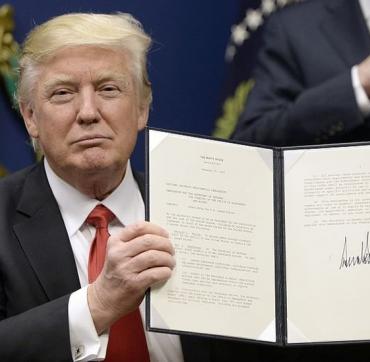The US Shifts From Progressive to Authoritarian Neoliberalism
especiales

“Shock and Awe,” “Fear and Chaos,” “Carnage”—these are just some of the more typical ways mainstream media have described the mood after Donald Trump’s first few weeks in office. From the latest announcements about removing Palestinians from Gaza and the draconian crackdown on immigrants through pulling the US out of the World Health Organization and freezing USAID and tariffs on trading partners, to declaring that the United States recognizes male and female as the only two genders, these executive orders and declaration impact a dizzying array of seemingly disparate issues.
What is clear is that we are witnessing a notable shift in relations of power in the US: from an era in which “progressive” neoliberalism characterized by deregulation, privatization, and financialized capitalism merged with progressive social agendas, such as diversity, equality and inclusion policies to an authoritarian and even fascist iteration of neoliberalism. This new formation deepens neoliberal policies but simultaneously replaces any progressive veneer with policies that single out and oppress marginalized groups. It also reverses any attempt to prevent climate breakdown, concentrating power in the hands of the executive and a few billionaire elites.
How did we get here?
Commentators have rightly pointed to the failures of the Democratic Party, which for decades has become ever more beholden to big money, abandoning not just the poor and working class along the way but increasingly sections of the middle-class. For many voters, moreover, the Biden Administration’s complicity in and support for the genocide in Gaza crystallized the moral bankruptcy of the Democratic Party, leading to the uncommitted movement, and millions of voters simply staying home on election day.
There is also no doubt that Trump’s return to the Oval Office is about his success in weaponizing the visceral fear, anxiety, anger and resentment of ever-growing groups who feel abandoned by the state and have been increasingly living in precarity. Trump’s victory is due to his ability to frame these people’s grievances as if they overlap with the interests of world’s wealthiest people—the likes of Elon Musk and Jeff Bezos.
The common enemy, voters were told again and again, is the deep state, the swamp in DC and the entire corrupt political system. But while this rhetoric appealed to different groups, it also helped to obscure Trump’s real objectives: to further shrink the state through more deregulation, privatization, and decreasing taxes paid by the wealthy, while providing corporate welfare to all his big donors. Musk might have donated $200 million to the MAGA campaign, but Trump will now ensure that taxpayers’ money will be channelled back to Musk’s coffers multiplying his initial investment several fold. This accounts for Trump’s move to reassert aggressive neoliberal policies, such as rescinding restrictions on oil drilling in Alaska.
Yet, how do we account for millions of voters’ sharp rightward and indeed regressive turn on social issues, a shift that is exemplified by big tech’s current alignment with Trump? After all, Silicon Valley had been at the forefront of “progressive” neoliberalism—particularly on issues relating to gender equality and DEI initiatives. Just think of the former COO of Facebook Sheryl Sandberg’s 2013 feminist manifesto Lean In, which was a harbinger of a neoliberal feminism, encouraging women to lean in to their careers rather than opt-out of paid employment.
To further cement the bond among his disparate supporters, Trump and MAGA Republicans successfully untethered as well as fomented two powerful historical forces, white supremacy and misogyny. These have always been part of the US’ s cultural fabric but have been attenuated and curtailed by progressive movements and legislation over the past fifty years.
White supremacy and misogyny have helped to further solder the somewhat tenuous bond between the precarious, those who feel abandoned, and the obscenely wealthy. The strategy, in other words, has been to displace and redirect anger and anxiety toward age-old easy scapegoats: immigrants, black and brown people, queer and trans folk, and unruly women and their bodies.
These various strategies have worked extremely well. Trump and his supporters have attacked critical race studies and DEI and replaced them with discourses that have always served authoritarian and fascist governments, such as ethnic nationalism and gender traditionalism. To be sure, this trend is not new and did not begin with Trump, but these processes have now been given unbridled license under his leadership.
The attack on progressive forces can be seen, for instance, in the mainstreaming of a network of women who call themselves traditional housewives, or “tradwives” for short. Posting on social media, these women present themselves as having been liberated from the corporate rat race. They actively promote a lifestyle that takes pleasure in traditional domestic duties, feminine submissiveness, and wifehood.
The tradwife phenomenon was peripheral just a few years ago. Today, it boasts an array of influencers who have garnered significant media attention. Mainstream media outlets now cover their stories, highlighting these women’s embrace of gender traditionalism and their declarations of liberation from the straightjacket of neoliberal feminism’s ideal of a happy work-family balance.
The horrific irony is that gender traditionalism and ethnic nationalism are coming to stand in for freedom. Tradwives insist on “the joy and freedom that comes from submitting to their husbands” and see themselves as symbolising the ability to throw off the shackles of state regulation and societal restrictions.
It is precisely this convergence of forces—the Democratic Party’s moral and political bankruptcy, the entrenchment of neoliberal capitalism and financialisation, the rise of big tech’s influence, and the resurgence and strategic mobilisation of misogynist and ethnic-nationalist rhetoric—that has propelled this shift to an authoritarian-fascist iteration of neoliberalism.
Where do we go from here?
One key lesson from the 2024 elections is that for many US voters—even those who are not die-hard MAGA supporters—upending the unbearable status quo has become paramount, trumping whatever concerns some may have about the unabashed racism and misogyny of the MAGA movement. Many are likely gleeful at the wrecking ball strategy of Trump’s first days in power.
Going forward, the left will have to address people’s desire to destroy the status quo, but also their yearning for a different form of governance, one not created in the image of the corporation.
Another important lesson involves the centrality of tapping into people’s emotions. Addressing the material conditions that have produced precarity and mass grievance may well not be enough. The left will also need to untangle voters’ affective attachments and what they signify so that they can cultivate these powerful forces and reorient them.
Only by learning hard lessons—and before it is too late–will a progressive left bloc be able to regroup and convince US voters to join them in their struggle for a more just and sustainable future.
Catherine Rottenberg, a professor at Goldsmiths, University of London, is co-author of The Care Manifesto (Verso, 2020) as well as author of The Rise of Neoliberal Feminism (Oxford UP, 2018).














Add new comment